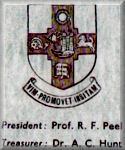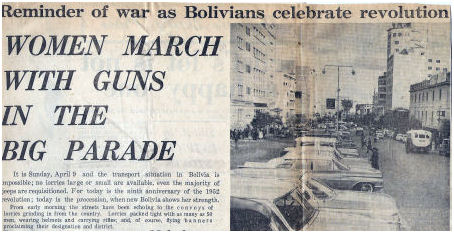University
of Bristol Trans-Continental Expedition 1960 — 61 | ||||||||
| ||||||||
| published 4 July 1961 | ||||||||
It is Sunday, April 9 and the transport situation in Bolivia is impossible; no lorries large or small are available, even the majority of jeeps are requisitioned. For today is the ninth anniversary of the 1952 revolution; today is the procession, when new Bolivia shows her strength. From early morning the streets have been echoing to the convoys of lorries grinding in from the country. Lorries packed tight with as many as 50 men, wearing helmets and carrying rifles; and, of course, flying banners proclaiming their designation and district. These are the campesinos (peasant farmers) and the miners, the "strength" behind the government. The major reforms of the Revolutionary Government have been: A system of agrarian reform by which the land has been taken away from the old owners and redistributed among the people actually working it; the nationalisation of the larger mines, partially in an attempt to keep money in the country; and the extension of the suffrage to include all people over 18, irrespective of education. Army cut It was hoped by these methods to dignify the status o those large sections of the people who had been ignored and exploited before. And education has been slowly extended to many - particularly Indians - who had previously had no such opportunities. At the same time the Army (so often the source of counter-revolutionary power) was drastically reduced in numbers and is now largely used as a labour force in opening up the under-developed areas of the country and the workers were made into Civil Militia organised into regiments and armed. Six hours Trade Unions (known as Sindicatos) were formed among workers of all kinds, industrial, mining, railways, taxi-drivers, peasants, ferry operators, etc., and, since the standard of education was low, leaders (national, regional and district) were appointed. These were the people who had come to La Paz to show their solidarity and their support for the government of the Movimento Nationalista Revolutionario. [MNR] The procession began at 2.30, and it lasted six hours. It must have been, at least six miles long, and at a wild guess, was perhaps over 100,000 strong.. Memories About 95 per cent were civilians - many armed - dressed in heir normal clothes, the men with their striped ponchos and woollen hats, the women wearing shawls. All were marching in imitation - almost parody - of the small army detachments that preceded them. The army was very smart. They use the goose-step for the actual march-past - ferociously competent - and this height of military efficiency brought back unhappy memories for us. Many of the campesinos - particularly the standard bearers - attempted the same in a semi-trained way, some serious, some grinning, right arms extended in a V-salute. On the balcony of the palace stood the President acknowledging the salute in the same way. It was a strange reminder of the last war with both sides president at the same time, as it were. Sirens wailed, planes (four of them) roared to and fro overhead, and more and more detachments poured into the square - "Commando National del Pofessionales del M.N.R.," "Brigada Femina Juventud M.N.R.," Regimento Campesino No.3," "Dirrection de Co-operativos," "Ministerio de Agricultura", girls from government offices having difficulty with their high-heels, miners with helmets, yellow oil skins, sten guns and large boxes of gelignite with fuses wound around their bodies. Most individuals carried a small paper Bolivian flag, once 100 peasant women marched past carrying a 50-yard long flag horizontally. And there were slogans - "Dignity to the work of the peasants," " Owners of the land we possess," " The working classes entered into the Government in 1952," "Death to nepotism," "Death to counter-revolutionaries," "Death to traitors." And still the detachments filed past. There were rifles (some even carried by women) sten-guns, bren-guns, bazookas, mortars (complete with bombs), a sobering sight in the hands of semi-trained personnel. Many showed their enthusiasm by firing off their armaments - into the air, fortunately - and rifle and machine-gun fire heralded the arrival in the square of each new group. High spirits Gunshots are not uncommon in La Paz, sometimes at night, and frequently at weekends, bursts of firing are heard - the many hills around throw back five or six echoes to make it sound like a regular fusillade. Sometimes the miners ride to town in trucks, tossing small pieces of gelignite over the side as they go. These are examples of high spirits, largely, but are also a reflection of the sudden power these sections of the people have gained, and still wish to wield. This power is very real. Although grateful, and probably faithful at the revolutionary party which had dignified their status, the workers do little to help it solve the country's enormous problems. The revolution has not brought about a moral regeneration, and the Government often finds itself powerless to promote necessary reforms. It has had a pendulum effect, and the excesses are now on the other side. The mines, and industry in general are largely overstaffed, but the Sindicatos will not countenance the laying off of redundant workers. Gaoled Since there are so many unproductive hands to pay, the payment is low for all, and yet the industries continue to lose money. In the cases where dismissal of workers is allowed, the payment of three months' salary is demanded; thus you hear stories of domestic servants deliberately giving unsatisfactory service in order to compel dismissal and gain the unearned salary. Other sad stories are quoted. A small manufacturer, losing money, wished to declare himself bankrupt; three times he tried and was refused permission on the grounds that he would put his three workers out of employment. In desperation he eventually made over his concern to his works … and was gaoled for his pains. | ||||||||
|


 April
9th
April
9th